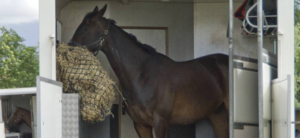 Shipping Fever in Horses: Horses that are trailered for long periods of time—more than three or four hours—are at increased risk for developing a respiratory infection commonly known as “shipping fever.” Owners who plan to transport horses can take steps before, during, and after the trip to minimize the chance of a horse developing this infection. It can easily derail training, competition, or breeding plans for several weeks.
Shipping Fever in Horses: Horses that are trailered for long periods of time—more than three or four hours—are at increased risk for developing a respiratory infection commonly known as “shipping fever.” Owners who plan to transport horses can take steps before, during, and after the trip to minimize the chance of a horse developing this infection. It can easily derail training, competition, or breeding plans for several weeks.
Before the trip:
- Be sure the horse is in good health. Don’t ship horses that are already sick. Horses that have been subjected to unusual stress such as a difficult competition may have had challenges to their immune systems that can make them more susceptible to illness.
- Have the horse rested, hydrated, and well-nourished in the days before the trip so that he is in the best condition to resist disease.
- Know the horse’s normal temperature, pulse, and respiratory rate.
- While it might seem like a good idea to administer antibiotics to horses before travel, research has shown that giving bronchodilators or antibiotics does not prevent all cases of shipping fever.
- Be sure that horses are current on vaccinations against respiratory viruses such as influenza and equine herpes virus. Vaccines should be administered two to three weeks before the horse travels to maximize antibody response because the stress of travel may suppress the immune response if administered just before shipping.
During the trip:
- Provide ventilation in the trailer. Breathing warm, damp, dusty air for several hours can set up a perfect scenario for respiratory tract irritation.
- If you are going to provide your horse with a hay net, soak the hay before traveling to remove dust particles. Damp hay can mold quickly. You will need to provide fresh dampened hay at least once a day on multi-day trips.
- Every three or four hours on a long trip, stop for half an hour to let the horses rest. Many horses won’t drink or urinate while the trailer is moving, and rest stops allow them to relax a bit.
- If the horse is tied in the trailer, unsnap lead shanks or cross ties at rest stops so the horse can lower his head and stretch his neck. This natural head-down position allows fluids, bacteria, and dust particles to drain from the upper respiratory tract.
- On long trips, check pulse, respiration, and body temperature to detect possible illness as soon as possible. Pulse and respiration will probably be a bit faster than normal because of stress. If body temperature rises, this is a warning flag for infection.
After the trip:
- If possible, turn the horse out in a small paddock for an hour or longer after unloading. This allows him to relax, stretch, and graze before going into his stall.
- Monitor vital signs for several days and check the horse regularly for a fever, cough, or nasal discharge. Check with a veterinarian if any horse shows signs of illness after travel.
In conclusion, do you have a specific question about Shipping Fever in Horses? Contact J & J Hay Farms today at 770-887-0440!
Article Source: Kentucky Equine Research
